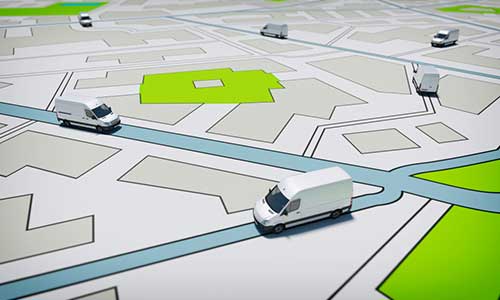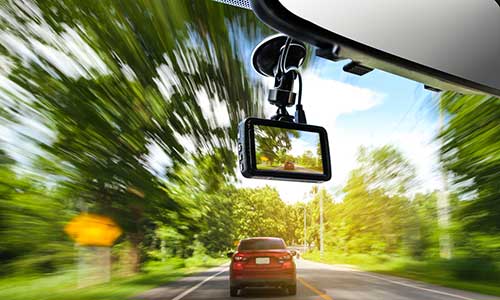
As a fleet manager, you are responsible for monitoring company vehicles as well as drivers so you can responsibly allocate company resources. While it may be a complex and confusing task at times, luckily, there are several fleet management tools available to help you optimise the process. One such solution is vehicle telematics.
Telematics is the process of using telecommunication and other technologies to source information from fleet vehicles. These include Global Positioning Systems (GPS), as well as various sensors in the vehicle and its engine.
Using the readings from these, vehicle telematics products can give you the location, speed, driver behaviour reports and maintenance requirements of the vehicle. This data is then used to streamline processes, ensure efficiency and improve service.
As a fleet manager, telematics can provide you with several useful insights that could help you improve your fleet’s efficiency and safety. Here are some benefits that telematics provides:
However, to enjoy all these benefits, there are certain essential features a vehicle telematics product should have.

A comprehensive vehicle telematics product will give you a detailed overview of each vehicle in your fleet. Using information gathered from the GPS, the product should be able to show you real-time locations, routes taken and the times when vehicles were not in use.
- Route recommendation
This information then allows your telematics product to suggest the most efficient routes for your vehicles, helping them avoid congested areas as well as reducing the number of miles travelled.
- Driver behaviour
Using GPS, you may also monitor driver behaviour, including erratic or unsafe driving. This gives you vital information about the areas in which your drivers need to be trained, ensuring driver and vehicle safety while also improving fuel consumption and reducing incidences of harsh acceleration and braking.
- Live updates
An important aspect of fleet management is ensuring you know where your vehicles and drivers are. If your telematics product features vehicle tracking, you no longer have to rely on them calling to log their location.
That saves both you and them time and effort. In addition, you are able to offer a better service to your customers, with more accurate information on when drivers are expected to arrive.
In addition to live updates and vehicle tracking, a comprehensive vehicle telematics feature set should also include reporting as standard. It should provide regularly scheduled updates on daily vehicle activity, timesheets, mileage and much more. These reports should also be customisable so you can make them as detailed as you want.
- Fleet maintenance
Through detailed reporting, your telematics solution should let you know how many miles a vehicle has run. Since most maintenance procedures, such as oil changes and tyre checks, depend on how many miles the vehicle has travelled, you are better informed about when you need to complete these actions.
With regular upkeep and preventative care, your fleet vehicles are less likely to need more expensive repairs.
Geofencing is a vital telematics feature that could help keep your fleet safe from theft or misuse. A geofence is a pre-defined area within which your vehicles can operate, and your telematics solution sends a notification if any vehicle leaves that area.
This notification can help you detect if vehicles have left your business premises without authorisation, or have been removed illegally. The telematics product would also inform you if one of your drivers takes the vehicle outside the area in which they are supposed to be operating.
A comprehensive vehicle telematics product gathers vast amounts of information and then processes it to give you a report. Therefore, it needs a computer that is fast enough and powerful enough to save and process vast quantities of information.
However, not every business has the means or space to install computers with high processing power and large storage space to deal with all the data a such a product generates. That is why it is best to find a cloud-based telematics solution, offering you a licensed Software-as-a-Service (SaaS) solution.
A SaaS solution gives you access to a cloud-based software product so you don’t need to install it on your computer or network. All you require is a device with an internet connection to access the application. One of the most significant advantages of this is the fact that you don’t need to be desk-bound to use it.
Another important benefit it offers is that you don’t need an expensive or extensive infrastructure to run it. You can enjoy all the information that a comprehensive telematics solution provides without having to buy and maintain storage space to accommodate all of it.

Whilst location tracking on your fleet is helpful for monitoring where your vehicles go, an in-vehicle CCTV system provides additional peace of mind for drivers and companies in case of accidents. If your driver is hit by another vehicle while driving, it can be difficult to prove who was at fault if there weren’t any witnesses around.
With a camera in the vehicle recording the events, you can protect your employees from any false accident claims.
As you can see, vehicle telematics can be an excellent way of getting an overview of your entire fleet whilst ensuring the safety of both your drivers and vehicles. Investing in one that offers complete visibility can help you improve safety processes and management of your fleet too.
At SG Fleet, our telematics product, Motrak, offers all these benefits and more. We also offer full customisation to give you bespoke features that may be necessary for your business.
If you would like to learn more about Motrak and the benefits this telematics product offers your fleet, please get in touch by calling 0844 854 5100 or emailing CSalmon@sgfleet.com.